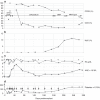Harmonizing definitions for hematopoietic recovery, graft rejection, graft failure, poor graft function, and donor chimerism in allogeneic hematopoietic cell transplantation: a report on behalf of the EBMT, ASTCT, CIBMTR, and APBMT
- PMID: 38443706
- PMCID: PMC11161398
- DOI: 10.1038/s41409-024-02251-0
Harmonizing definitions for hematopoietic recovery, graft rejection, graft failure, poor graft function, and donor chimerism in allogeneic hematopoietic cell transplantation: a report on behalf of the EBMT, ASTCT, CIBMTR, and APBMT
Erratum in
-
Correction: Harmonizing definitions for hematopoietic recovery, graft rejection, graft failure, poor graft function, and donor chimerism in allogeneic hematopoietic cell transplantation: a report on behalf of the EBMT, ASTCT, CIBMTR, and APBMT.Bone Marrow Transplant. 2024 Sep;59(9):1335. doi: 10.1038/s41409-024-02336-w. Bone Marrow Transplant. 2024. PMID: 38907026 Free PMC article. No abstract available.
Abstract
Despite emergence of novel therapies to treat hematologic malignancies, allogeneic hematopoietic cell transplantation (allo-HCT) remains an essential treatment modality capable of curing these diseases. Allo-HCT has been also shown to be curative in benign hematologic disorders such as aplastic anemia, sickle cell disease, and thalassemia, among others. Recently, the American Society for Transplantation and Cellular Therapy (ASTCT) published standardized definitions for hematopoietic recovery, graft rejection, graft failure, poor graft function, and donor chimerism. To attempt broader international consensus, a panel of adult and pediatric physician transplant experts was assembled from European Society for Blood and Marrow Transplantation (EBMT), ASTCT, the Center for International Blood and Marrow Transplant Research (CIBMTR), and Asia-Pacific Blood and Marrow Transplantation (APBMT). Consensus was defined as ≥70% of voting members strongly agreeing or somewhat agreeing with a definition. With few exceptions, there was a consensus to endorse the prior ASTCT definitions. Importantly, we revised existing EBMT and CIBMTR data collection forms to align with these harmonized definitions that will facilitate research and international collaboration among transplant researchers and across transplant registries.
© 2024. The Author(s).
Conflict of interest statement
AS reports honoraria from Takeda, BMS/Celgene, MSD, Janssen, Amgen, Novartis, Gilead Kite, Sanofi, Roche, Alexion, consultancy for Takeda, BMS/Celgene, Novartis, Janssen, Gilead, Sanofi Speaker’s Bureau for Takeda and Research Support for Takeda. VRB reports participating in the Safety Monitoring Committee for Protagonist, serving as an Associate Editor for the journal, Current Problems in Cancer, and as a contributor for BMJ Best Practice, and receiving consulting fees from Imugene, research funding (institutional) from MEI Pharma, Actinium Pharmaceutical, Sanofi U.S. Services, Abbvie, Pfizer, Incyte, Jazz, and National Marrow Donor Program, and drug support (institutional) from Chimerix for a trial. MAK-D reports grant/research support from Novartis, Bristol Myers Squibb, and Pharmacyclics and consultancy for Kite Pharma. JWL has received honoraria from Alexion and is a consultant to Alexion, AlloVir, Sanofi, Kyowa Kirin, and Samsung. A.B. reports as a speaker bureau for Therakos, Adienne, Sanofi, Jazz, Novartis, Pfizer, Equillium, MSDi. NK reports honoraria from Kite/Gilead, Jazz, MSD, Neovii Biotech, Alexion, MSD, Takeda, Novartis, Riemser, Pfizer, and BMS, and research support from Neovii, Riemser, Novartis and DKMS. RS reports consulting for Astellas, Amgen, Vor Biopharma, Smart Immune, Neovii, Bluesphere Bio, Jasper, data safety montoring board for BMS and board of directors, NMPD – be the match, USA -. JK reports serving on board and consults for Mallinckrodt, EMD Serono, Merck, Cugene, Cue Biotherapeutics, Biolojic Design, Gentibio, Nekonal, Equillium, and Amgen; and receives grants/research support from BMS, Miltenyi, Regeneron, Equillium, Amgen and Clinigen. YA reports consulting fees from JCR Pharmaceuticals Co., Ltd., and Kyowa Kirin Co., Ltd.; lecture fees from Otsuka Pharmaceutical Co., Ltd, Chugai Pharmaceutical Co., Ltd., Novartis Pharma KK, AbbVie GK; and honorarium from Meiji Seika Pharma Co, Ltd. LK is on the scientific advisory board for HiFiBio and Mammoth Biosciences, reports research funding from Magenta Therapeutics, BlueBird Bio, Bristol Myers Squibb, Novartis, Gilead, EMD Serono, and Regeneron Pharmaceuticals, consulting fees from Vertex Pharmaceuticals, grants and personal fees from Bristol Myers Squibb and her conflict of-interest with Bristol Myers Squibb is managed under an agreement with Harvard Medical School. PAC, EAS, BNS, AH, JS, YT, PL, UP, HS, JF, S-O, and I.S-O declare no conflict of interest.
Figures

References
-
- Sureda A, Zhang MJ, Dreger P, Carreras J, Fenske T, Finel H, et al. Allogeneic hematopoietic stem cell transplantation for relapsed follicular lymphoma: a combined analysis on behalf of the Lymphoma Working Party of the EBMT and the Lymphoma Committee of the CIBMTR. Cancer. 2018;124:1733–42. doi: 10.1002/cncr.31264. - DOI - PMC - PubMed
-
- Ustun C, Le-Rademacher J, Wang HL, Othus M, Sun Z, Major B, et al. Allogeneic hematopoietic cell transplantation compared to chemotherapy consolidation in older acute myeloid leukemia (AML) patients 60-75 years in first complete remission (CR1): an alliance (A151509), SWOG, ECOG-ACRIN, and CIBMTR study. Leukemia. 2019;33:2599–609. doi: 10.1038/s41375-019-0477-x. - DOI - PMC - PubMed
-
- Kharfan-Dabaja MA, Labopin M, Polge E, Nishihori T, Bazarbachi A, Finke J, et al. Association of second allogeneic hematopoietic cell transplant vs donor lymphocyte infusion with overall survival in patients with acute myeloid leukemia relapse. JAMA Oncol. 2018;4:1245–53. doi: 10.1001/jamaoncol.2018.2091. - DOI - PMC - PubMed
MeSH terms
LinkOut - more resources
Full Text Sources

